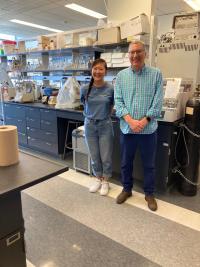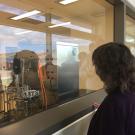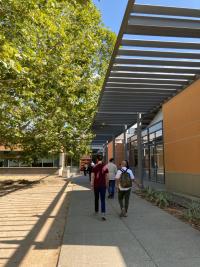BEST Training Program Goals
Funded via a National Science Foundation Research Traineeship, the Bioindustrial Engineering for a Sustainable Tomorrow (BEST - NRT Award #2346053) program will immerse graduate students in a comprehensive traineeship during which they will acquire key technical and professional skills for bioindustrial engineering, enabling these cohorts of scientists and engineers to tackle global challenges in food security, environmental sustainability, and human and animal health. In the case of global food security and shared resource stabilization, BEST trainees will explore technologies that may be used to add high quality protein to the food and feed supply, prevent regional and disaster-related famine and malnutrition, reduce overfishing and deforestation, and help to limit negative environmental impacts currently associated with food production. BEST will emphasize the need to find resource efficiencies in bioprocess designs, not only to save costs, but with attention to reducing greenhouse gas (GHG) emissions, reducing toxic manufacturing waste streams, minimizing water use and energy consumption, and repurposing or using waste streams as feedstocks - critical work for supporting the U.S. and global bioeconomy.

Master’s and doctoral trainees will complete an introductory technical workshop, a 3-quarter course series, including the development of a Capstone Team Design Project, and participate in experiential learning opportunities (outreach, science communication and industry internships) to build technical and transferrable professional skills needed to successfully design and deploy novel bioprocesses. BEST will provide graduate students with training and professional development across six broad categories – 1) Bioprocessing Technical Skills, 2) Technoeconomic and Life Cycle Analyses, 3) Project Management, 4) Team Science, 5) Science Communication and 6) Bioethics and Professionalism.
The BEST training program will build on successful components of the Designated Emphasis in Biotechnology (DEB) doctoral training program and give life science graduate students the opportunity to participate in industry-aligned capstone projects common to engineering degree programs. BEST will complement the DEB by providing a formalized course series for teaching industrial biomanufacturing skills and by providing a mechanism to extend best practices in DEB doctoral education to UC Davis master’s degree trainees. Industry-aligned capstone projects will give trainees experience with “real world” technical challenges that occur in industrial biomanufacturing settings.
Over the course of the five-year award period beginning in September 2024, the BEST leadership team, senior personnel, and faculty trainers will recruit and mentor ~45 graduate students interested in pursuing careers in bioindustrial engineering, a priority area of focus for the U.S. Potential trainee awards will include funded yearlong traineeships, support for industry internship participation, and support for professional conference participation. Graduate student trainees in faculty trainer labs and belonging to one of the eight BEST-affiliated graduate programs listed below will be eligible to apply for the BEST training program.
- Agricultural and Resource Economics
- Animal Biology
- Biochemistry, Molecular, Cellular, & Developmental Biology
- Biological Systems Engineering
- Chemical Engineering
- Food Science
- Nutritional Biology
- Plant Biology

BEST Research Focus Areas and Project Team
UC Davis has deep expertise in key disciplines needed to support the development of bioindustrial manufacturing across a range of applications, including BEST research focus areas listed below:

- Cultivated Meat (i.e., growing animal muscle, fat, and connective tissue cells in large-scale bioreactors to produce a meat product)
- Alternative (Alt) Proteins for Human and Animal Nutrition (i.e., alternative proteins as meat, egg, or dairy products that are plant-based, cultivated, and/or derived via microbial fermentation)
- Natural or Recombinant Plant/Algal Proteins and Small Molecules for Industrial Applications (i.e., growing plants, plant cells or algae under controlled conditions for a broad range of industrial applications; for food applications this is often referred to as cellular agriculture or precision fermentation)
Capitalizing on this expertise, UC Davis serves as a governing member of BioMADE and is the home of the Cultivated Meat Consortium (CMC, founded in 2019) and the Integrative Center for Alternative Meat and Protein (iCAMP, founded in 2024).
Project Leadership
- PI Juliana M. L. N. de Moura Bell (Food Science and Technology) - Expertise in sustainable downstream bioprocessing of proteins and food components and using agricultural waste for high value products/low-cost media development.
- Co-PI David Block (Viticulture and Enology; Chemical Engineering) - Expertise in bioprocessing, cell culture, and precision fermentation across food/beverage applications, including media optimization for cultivated meat.
- Co-PI Anna Denicol (Animal Science) - Expertise in cell line development of animal-derived iPSCs (stem cells) for cultivated meat.
- Co-PI Denneal Jamison-McClung (Biotechnology Program) - Expertise in public-private partnerships to support biotech training and research and best practices for graduate level education, mentoring, and professional development.
- Co-PI Somen Nandi (Chemical Engineering; Global Healthshare Initiative) - Expertise in plant genetic engineering, plant-based bioprocesses, and technology development, commercialization, and deployment.
Senior Personnel
- Karen McDonald (Chemical Engineering) - Expertise in techno-economic and life cycle analyses (TEA/LCA) of industrial bioprocesses for cultivated meat and plant-based biomanufacturing systems.
- Ned Spang (Food Science and Technology) - Expertise in techno-economic and life cycle analyses (TEA/LCA) for industrial bioprocesses and food technologies.
- Daniel Sumner (Agricultural and Resource Economics) - Expertise in the economics of food and agriculture, including domestic and global policies, and the market evolution of the alt protein and cultivated meat industries.
- Philipp Zerbe (Plant Biology) - Expertise in plant genomics, metabolomics, protein biochemistry, and metabolic pathway engineering.
Research and Training Focus Groups
PI de Moura Bell will lead the Alternative (Alt) Proteins for Human and Animal Nutrition group and faculty trainers will include Daniela Barile (Food Science and Technology), David Mills (Food Science and Technology), Justin Siegel (Chemistry), Payam Vahmani (Animal Science), and Ruihong Zhang (Bio and Ag Engineering).
Co-PI Denicol and Co-PI Block will co-lead the Cultivated Meat group and faculty trainers will include Keith Baar (Neurobiology, Physiology and Behavior; Medicine: Physiology & Membrane Biology), J. Kent Leach (Biomedical Engineering), Nitin Nitin (Food Science; Biological and Agricultural Engineering), Priya Shah (Chemical Engineering, Microbiology), Lucas Smith (Neurobiology, Physiology and Behavior), and Jiandi Wan (Chemical Engineering).
Co-PI Nandi will co-lead Natural or Recombinant Plant/Algal Proteins and Small Molecules for Industrial Applications group with Senior Personnel Zerbe, and faculty trainers will include Diane Beckles (Plant Sciences), Abhaya Dandekar (Plant Sciences), Oliver Fiehn (Molecular and Cellular Biology; Metabolomics Core Facility - Genome Center), and Nitzan Shabek (Plant Biology).

BEST will also structure all research activities to include two cross-cutting areas of training: 1) Technoeconomic Modeling and Analyses [TEA]/Life Cycle Analyses [LCA] and 2) Bioethics and Professionalism. Co-PI’s Block and Nandi, and Senior Personnel McDonald, Spang, and Sumner, will co-lead the Technoeconomic Modeling and Analyses [TEA]/Life Cycle Analyses [LCA] group, integrating modeling across research areas and the DEB298 course series/Capstone Team Design Projects. Co-PI Jamison-McClung will lead Bioethics and Professionalism within the DEB298 course series (e.g., team science, sci comm, bioethics), via engagement with industry partners (IAC members and others) to facilitate summer internships and ensure curricular alignment with industry workforce needs. She will also oversee project dissemination and broader impacts through the BioTech SYSTEM K-14 STEM outreach consortium.
Industry Advisory Committee (IAC)

The BEST Team will be working closely with industry partners serving on the Independent Advisory Committee (IAC) to ensure that the training program is aligned with workforce needs. The IAC is currently composed of industry professionals working across a variety of industrial biomanufacturing settings and non-governmental organizations. For example, IAC members focused on bringing cultivated meat to market include Mission Barns and Orbillion Bio, while those working in the alt protein sector include The Better Meat Co and TurtleTree, and plant-based bioengineering companies include California Cultured (plant cell cultured chocolate and coffee) and GALY (cotton fibers). IFF is a large, global company with deep expertise in bioindustrial engineering to produce enzymes and other useful biomolecules for a variety of consumer product applications. New Harvest is a non-governmental organization with a global vision for the role that cellular agriculture and bioindustrial engineering could play to improve environmental sustainability and quality of life for both humans and animals.


